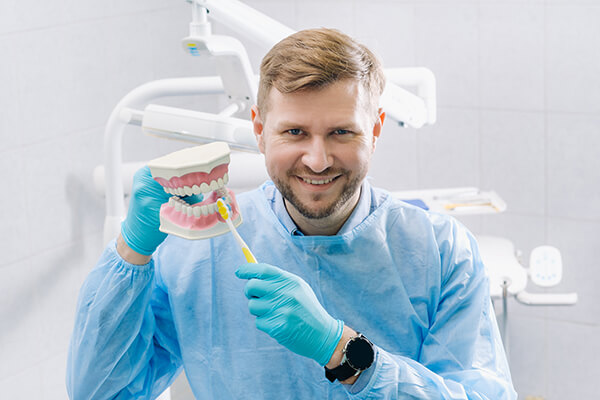Learn Regarding Frequent Dental Problems Your Dentist Can Resolve
Recognizing regular oral problems is critical for preserving ideal dental health. Concerns such as tooth cavities, gum disease, tooth level of sensitivity, halitosis, and tooth decay prevail yet typically ignored up until they come to be extreme. Dental practitioners have the experience to detect and deal with these problems, thus stopping further issues. Regular dental brows through and personalized care plans can address these problems efficiently, making sure a healthier and brighter smile. What certain treatments do dentists utilize to fight these concerns, and just how can early intervention make a difference? The response to these questions offer important understandings into guarding your oral health and wellness.
Tooth Cavities
Cavities, additionally referred to as tooth decays, are a prevalent dental health and wellness concern triggered by the demineralization of tooth enamel due to acid production from bacterial plaque. This process starts when bacteria in the mouth metabolize sugars and starches from food, producing acids that wear down the enamel. Otherwise resolved quickly, this erosion can penetrate deeper right into the tooth, impacting the dentin and ultimately the pulp, potentially bring about extreme pain and infection.
The onset of cavity development often present as white spots on the tooth surface, showing preliminary demineralization. As the procedure progresses, these spots can develop into black or brownish lesions, indicating much more substantial degeneration. Regular dental exams are essential for early detection, as tooth cavities in their nascent phases can be treated with remineralization techniques, such as fluoride treatments.
As soon as a tooth cavity has developed, restorative intervention is required. Dentists usually remove the corroded portion of the tooth and load the dental caries with materials such as composite material, amalgam, or ceramic. In a lot more severe instances, a crown or root canal therapy might be called for. Precautionary procedures, consisting of excellent dental hygiene techniques and nutritional adjustments, play a critical function in alleviating the risk of tooth cavities.
Gum Tissue Illness
While cavities represent a significant problem for oral wellness, an additional crucial problem that demands focus is periodontal disease. Recognized as gum disease, gum tissue illness is an inflammatory problem influencing the cells surrounding and supporting the teeth. It is mainly caused by the buildup of plaque-- a sticky movie of germs that forms on teeth.
Gum illness advances with stages, beginning with gingivitis, defined by redness, swelling, and bleeding periodontals (dentist eugene oregon). If left untreated, gingivitis can rise to periodontitis, where the internal layer of the gum tissue and bone retreat from the teeth, developing pockets that become contaminated. In time, the contaminants produced by the microorganisms damage down the bone and connective cells that hold teeth in position, potentially leading to missing teeth
Early discovery and therapy are essential. Professional oral cleanings and boosted dental health techniques, such as cleaning twice day-to-day and flossing, can manage gingivitis. For more innovative phases, treatments may consist of scaling and origin planing, antibiotics, and even medical treatments.
Routine dental check-ups play a crucial duty in taking care of and stopping periodontal disease. Dental professionals can identify very early indications and suggest suitable treatments, making certain the maintenance of healthy and balanced periodontals and total dental health and wellness.
Tooth Sensitivity
Tooth level of sensitivity impacts millions of people worldwide, offering a common yet typically stressful dental problem. This problem emerges when the enamel, the outermost protective layer of the teeth, is endangered, revealing the underlying dentin.
A number of elements add to enamel erosion and succeeding tooth level of sensitivity, consisting of hostile brushing, acidic foods and drinks, gum economic downturn, and bruxism (teeth grinding) Furthermore, oral procedures such as teeth bleaching can briefly enhance sensitivity.
Foul Breath
An additional prevalent dental worry that affects people' everyday lives is bad breath, clinically called halitosis. Halitosis typically stems from inadequate dental health, which enables food bits to remain in the mouth, cultivating microbial growth.

Dental professionals play a vital function in dealing with and detecting halitosis. They can recognize the source with a thorough examination and offer tailored advice and treatment strategies. Suggestions may entail enhancing dental hygiene techniques, such as normal cleaning and flossing, making use our website of antibacterial mouthwashes, staying hydrated, and dealing with any oral problems. Sometimes, a referral to a specialist may be essential to take on underlying health and wellness problems adding to foul-smelling breath. Effective monitoring of halitosis not just boosts oral wellness yet also dramatically improves lifestyle.
Tooth Degeneration

Preventing dental cavity entails a mix of great oral hygiene methods and regular oral examinations. Brushing teeth a minimum of twice daily with fluoride tooth paste, flossing to get rid of plaque in between teeth, and restricting the intake of sweet foods and beverages are essential safety nets. Fluoride treatments, dental sealants, and professional cleanings offered by a dental professional can likewise play a considerable duty in strengthening enamel and stopping decay.
Dental practitioners can eliminate corroded cells and bring back the tooth with fillings made from materials such as composite material, amalgam, or porcelain. By attending to tooth decay without delay, dental experts aid preserve dental structure and function, ensuring long-lasting dental wellness.
Final Thought
Addressing typical dental concerns such as tooth cavities, periodontal condition, tooth level of sensitivity, halitosis, and dental cavity is vital for preserving ideal oral health and wellness and overall well-being. Dental practitioners possess the experience to diagnose and treat these issues effectively, ensuring customized take care of each patient. Normal preventative actions and dental examinations are essential in determining and taking care of these problems early, promoting a healthier and extra confident smile over a life time.

Tooth degeneration, additionally understood as dental caries, takes place when the enamel, the outer layer of the tooth, is worn down by acids created by germs in the mouth. Brushing teeth at the very least two times daily with fluoride toothpaste, flossing to get rid of plaque between teeth, and restricting the consumption of Going Here sweet foods and drinks are essential precautionary steps.Addressing common oral issues such as tooth cavities, gum tissue illness, tooth sensitivity, poor breath, and tooth decay is important for maintaining ideal oral wellness and total well-being.